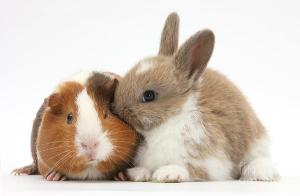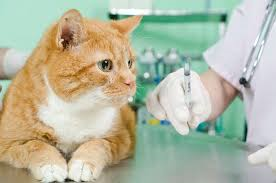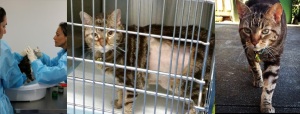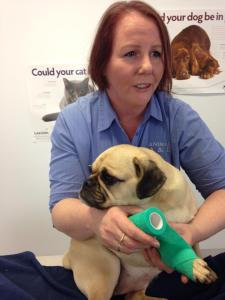
A caesarean section is a major surgical procedure used to deliver babies when normal birth isn’t possible. This is done by surgically entering the abdomen to remove the babies directly from the uterus. While caesareans are sometimes needed for cats, they are a lot more common with dogs, especially particular breeds such as bull dogs. However, birth complications are life threatening to all mothers and their offspring when delivery isn’t progressing normally, regardless of species or breed. Therefore, pets experiencing birth complications may be in need of a caesarean and must be taken to a 24 hour vet clinic immediately for emergency surgery.
In most cases, pet owners won’t be aware that their pet is in need of a caesarean until they begin giving birth. When your pet is pregnant and close to giving birth, it is important to keep a close eye on them, especially during the delivery, and be at the ready to take them to a 24hr animal hospital in an emergency.
When your pet is in labour, the most obvious signs that they may be in need of a caesarean are:
• Your pet has been having contractions for more than 2 hours without delivering a puppy/kitten (even after the first delivery)
• Your pet appears too tired to push out the puppy/kitten
• There is a puppy/kitten stuck in the birth canal
• If your pet hasn’t delivered all puppies/kittens (providing you have had x-rays taken to determine the litter size)
• If there is a green discharge from the vulva and no puppies/kittens are produced
A caesarean section will normally take between 1-1.5 hours by an experienced emergency veterinarian and then a further 1-3 hours for recovery in a pet hospital. During the surgery and post-operative care, your pet will be closely monitored and administered anaesthetic, pain relief, IV fluids and antibiotics. Puppies/kittens will also be closely monitored to ensure they are suckling well and kept clean, dry and warm.
Generally within a few hours after surgery, your pet and her new puppies/kittens will be discharged to return home. It is important to allow your pets to have some time alone together to feed and bond, while still keeping an eye on them. Pet owners should also remember to bring their pet in for a veterinary check-up 1-2 days after surgery, and stitches will need to be removed in 10-14 days following surgery. Your vet will be able to instruct you on any additional pet care required and schedule an appropriate time to begin vaccinations and worming treatment (usually between 3-6 weeks after birth).
It is important to closely monitor your pet and her new puppies/kittens and contact a 24 hour veterinary clinic if you have any concerns at all. If you notice any of the following then it may be an animal emergency (such as mastitis, eclampsia or unwell puppies/kittens), which needs to be seen by a 24hr emergency vet urgently:
- The puppies/kittens aren’t feeding regularly or at all (roughly every 3 hours is normal)
- The puppies/kittens are crying excessively (they should be sleeping or feeding 90% of the time)
- The puppies/kittens are cold (their environment should be kept at roughly 30°c)
- The caesarean wound is discharging, red or inflamed
- Mammary glands are swollen, inflamed, hard or painful
- Mother reluctant to nurse or appears impatient with the puppies/kittens
- Any signs of fever/high temperature, shaking, tremors, seizures or high heart rate
Animal Accident & Emergency have two 24 hour Animal Hospitals in Melbourne, which are ideally located in Essendon and Point Cook and both with easy freeway access and amble parking. Our emergency vet clinics operate 24 hours a day, 365 days a year (including public holidays), and offer all the latest equipment and state of the art technology, as well as a 24 hour intensive care unit. Our dedicated team of emergency vets and nurses provide the highest standards of emergency vet care, critical care medicine and surgery, and are experienced in treating all emergencies from right across Melbourne, Geelong and Ballarat. So when you bring your pet to Animal Accident & Emergency you can rest assured that your pet will receive the best and most advanced vet care available.
If you believe your pet may be in need of a caesarean section or for any other veterinarian emergency, please contact one of our 24-hour animal emergency centres:
Essendon Fields (03) 9379 0700
Point Cook (03) 8368 7400
Always Open. We Always CARE

http://www.animalemergeny.com.au








